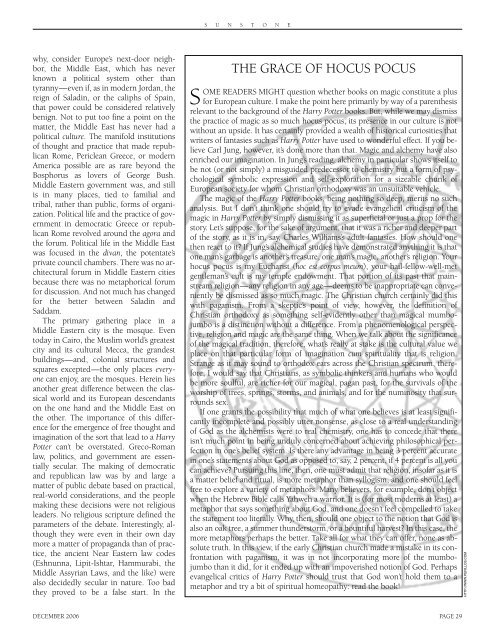Download Entire Issue PDF - Sunstone Magazine
Download Entire Issue PDF - Sunstone Magazine
Download Entire Issue PDF - Sunstone Magazine
You also want an ePaper? Increase the reach of your titles
YUMPU automatically turns print PDFs into web optimized ePapers that Google loves.
S U N S T O N E<br />
why, consider Europe’s next-door neighbor,<br />
the Middle East, which has never<br />
known a political system other than<br />
tyranny—even if, as in modern Jordan, the<br />
reign of Saladin, or the caliphs of Spain,<br />
that power could be considered relatively<br />
benign. Not to put too fine a point on the<br />
matter, the Middle East has never had a<br />
political culture. The manifold institutions<br />
of thought and practice that made republican<br />
Rome, Periclean Greece, or modern<br />
America possible are as rare beyond the<br />
Bosphorus as lovers of George Bush.<br />
Middle Eastern government was, and still<br />
is in many places, tied to familial and<br />
tribal, rather than public, forms of organization.<br />
Political life and the practice of government<br />
in democratic Greece or republican<br />
Rome revolved around the agora and<br />
the forum. Political life in the Middle East<br />
was focused in the divan, the potentate’s<br />
private council chambers. There was no architectural<br />
forum in Middle Eastern cities<br />
because there was no metaphorical forum<br />
for discussion. And not much has changed<br />
for the better between Saladin and<br />
Saddam.<br />
The primary gathering place in a<br />
Middle Eastern city is the mosque. Even<br />
today in Cairo, the Muslim world’s greatest<br />
city and its cultural Mecca, the grandest<br />
buildings—and, colonial structures and<br />
squares excepted—the only places everyone<br />
can enjoy, are the mosques. Herein lies<br />
another great difference between the classical<br />
world and its European descendants<br />
on the one hand and the Middle East on<br />
the other. The importance of this difference<br />
for the emergence of free thought and<br />
imagination of the sort that lead to a Harry<br />
Potter can’t be overstated. Greco-Roman<br />
law, politics, and government are essentially<br />
secular. The making of democratic<br />
and republican law was by and large a<br />
matter of public debate based on practical,<br />
real-world considerations, and the people<br />
making these decisions were not religious<br />
leaders. No religious scripture defined the<br />
parameters of the debate. Interestingly, although<br />
they were even in their own day<br />
more a matter of propaganda than of practice,<br />
the ancient Near Eastern law codes<br />
(Eshnunna, Lipit-Ishtar, Hammurabi, the<br />
Middle Assyrian Laws, and the like) were<br />
also decidedly secular in nature. Too bad<br />
they proved to be a false start. In the<br />
THE GRACE OF HOCUS POCUS<br />
SOME READERS MIGHT question whether books on magic constitute a plus<br />
for European culture. I make the point here primarily by way of a parenthesis<br />
relevant to the background of the Harry Potter books. But, while we may dismiss<br />
the practice of magic as so much hocus pocus, its presence in our culture is not<br />
without an upside. It has certainly provided a wealth of historical curiosities that<br />
writers of fantasies such as Harry Potter have used to wonderful effect. If you believe<br />
Carl Jung, however, it’s done more than that. Magic and alchemy have also<br />
enriched our imagination. In Jung’s reading, alchemy in particular shows itself to<br />
be not (or not simply) a misguided predecessor to chemistry but a form of psychological<br />
symbolic expression and self-exploration for a sizeable chunk of<br />
European society for whom Christian orthodoxy was an unsuitable vehicle.<br />
The magic of the Harry Potter books, being nothing so deep, merits no such<br />
analysis. But I don’t think one should try to evade evangelical criticism of the<br />
magic in Harry Potter by simply dismissing it as superficial or just a prop for the<br />
story. Let’s suppose, for the sake of argument, that it was a richer and deeper part<br />
of the story, as it is in, say, Charles Williams’s adult fantasies. How should one<br />
then react to it? If Jung’s alchemical studies have demonstrated anything it is that<br />
one man’s garbage is another’s treasure, one man’s magic, another’s religion. Your<br />
hocus pocus is my Eucharist (hoc est corpus meum), your hail-fellow-well-met<br />
gentleman’s cult is my temple endowment. That portion of its past that mainstream<br />
religion—any religion in any age—deems to be inappropriate can conveniently<br />
be dismissed as so much magic. The Christian church certainly did this<br />
with paganism. From a skeptic’s point of view, however, the definition of<br />
Christian orthodoxy as something self-evidently other than magical mumbojumbo<br />
is a distinction without a difference. From a phenomenological perspective,<br />
religion and magic are the same thing. When we talk about the significance<br />
of the magical tradition, therefore, what’s really at stake is the cultural value we<br />
place on that particular form of imagination cum spirituality that is religion.<br />
Strange as it may sound to orthodox ears across the Christian spectrum, therefore,<br />
I would say that Christians, as symbolic thinkers and humans who would<br />
be more soulful, are richer for our magical, pagan past, for the survivals of the<br />
worship of trees, springs, storms, and animals, and for the numinosity that surrounds<br />
sex.<br />
If one grants the possibility that much of what one believes is at least significantly<br />
incomplete and possibly utter nonsense, as close to a real understanding<br />
of God as the alchemists were to real chemistry, one has to concede that there<br />
isn’t much point in being unduly concerned about achieving philosophical perfection<br />
in one’s belief system. Is there any advantage in being 3 percent accurate<br />
in one’s statements about God as opposed to, say, 2 percent, if 4 percent is all you<br />
can achieve? Pursuing this line, then, one must admit that religion, insofar as it is<br />
a matter belief and ritual, is more metaphor than syllogism, and one should feel<br />
free to explore a variety of metaphors. Many believers, for example, don’t object<br />
when the Hebrew Bible calls Yahweh a warrior. It is (for most moderns at least) a<br />
metaphor that says something about God, and one doesn’t feel compelled to take<br />
the statement too literally. Why, then, should one object to the notion that God is<br />
also an oak tree, a summer thunderstorm, or a bountiful harvest? In this case, the<br />
more metaphors perhaps the better. Take all for what they can offer, none as absolute<br />
truth. In this view, if the early Christian church made a mistake in its confrontation<br />
with paganism, it was in not incorporating more of the mumbojumbo<br />
than it did, for it ended up with an impoverished notion of God. Perhaps<br />
evangelical critics of Harry Potter should trust that God won’t hold them to a<br />
metaphor and try a bit of spiritual homeopathy: read the book!<br />
HTTP://WWW.PERILLOS.COM<br />
DECEMBER 2006 PAGE 29

















